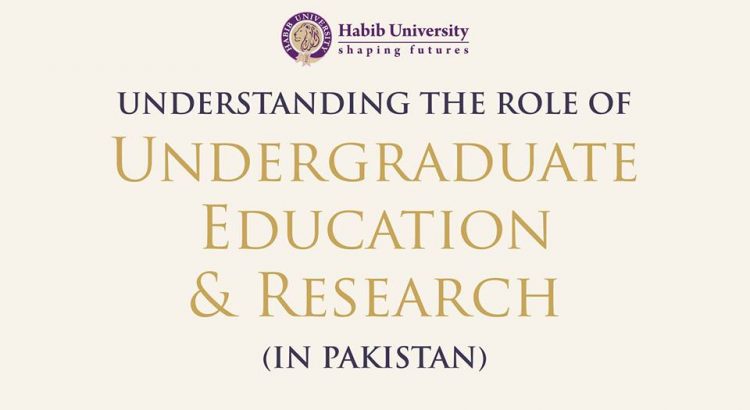By: Ayman Babar
(Student 2020 , School of Arts, Humanities and Social Sciences, Habib University)
A symposium titled “The Role of Undergraduate Research in Pakistan” was hosted by the Dhanani School of Science and Engineering on 28th September, 2018 as part of a two-day celebration to honor the Dhanani family and their generous endowment for the School of Science and Engineering. With Dr. Waqar Saleem, Program Director for Computer Science at Habib University as moderator, the panel consisted of prominent professionals Dr. Kulsoom Ghias, Dr. Sabieh Anwar and Dr. Amir Hasan intently discussing the importance of research at the undergraduate level, the barriers it faces and the way forward.
Undergraduate research is disregarded and sidelined due to a widespread lack of belief in the undergraduate students’ ability to generate significant and useful knowledge. However, the speakers stressed that not only does engaging in research at the undergraduate level benefit students by promoting critical thinking skills, student publications also benefit universities by increasing their visibility and enriching their profile. Operating within a culture where research at the undergraduate level is given neither precedence nor importance, the onus for providing support, encouragement and opportunity falls on the community. The panelists agreed that instead of looking towards external enablers such as government institutions, there is a need for internal enablers (for instance, educators) to work towards building an ecosystem that incentivizes and encourages research. For instance, the PhysLab co-founded by Dr. Sabieh Anwar aims to encourage scientific inquiry at the grassroots level through making laboratory resources publically accessible for the building and testing of experiments.
The speakers also spoke about research endowments and how a lack of funds is often cited as a barrier to research. However, they elaborated that instilling values integral to research does not necessarily require students to work on advanced projects that require copious funding. Instead, research should be embedded in learning by making class assignments more inquiry based, teaching methods more engaging and courses specifically designed to foster qualities of curiosity, persistence, analysis, interpretation and integrity. Essentially, there is a need to create an undergraduate system that embodies the values of research and incorporates them within the taught courses. Dr. Kulsoom cited AKU’s example where the curriculum requires students to perform research; once in their second year and then, more intensively, in their last year. According to her, familiarity with research makes doctors competent and relevant practitioners, aware of the latest developments within their field and armed with the skills to explore their own areas of interest.
The speakers talked about the need to move away from compartmentalizing knowledge through a strict categorization of different disciplines in order to move towards a more holistic educational experience. The panelists were of the opinion that research flourishes when given free rein and often, the best research is produced at the interfaces of disciplines. Habib University’s transdisciplinary approach to education aims to achieve precisely that by ensuring that aspiring engineers are aware of their social context and future social scientists adept at technology and familiar with science.
Hosting and attending panel discussions might bring these issues to light but the main question we need to ask ourselves is this: if we are to rectify the current crisis in higher education, what can be our contribution? What can we do in our personal capacity, as teachers, parents, students and citizens? What role can parents play in harnessing a child’s curiosity, how can mentoring and tutelage enhance the learning experience and how can we as a society be more accepting of research that does not conform to our worldview and challenges the current notions we prescribe to?
Highlights of the symposium held on Friday, 28th September, 2018 at Habib University.
https://www.facebook.com/HabibUniversity/videos/172146140353345/
View the full video here:
